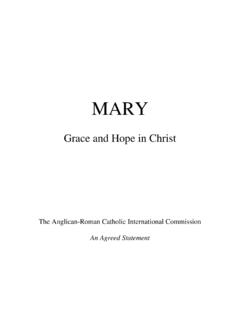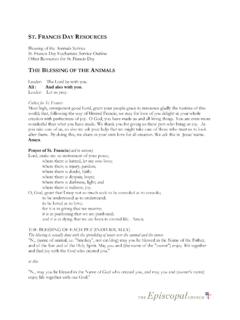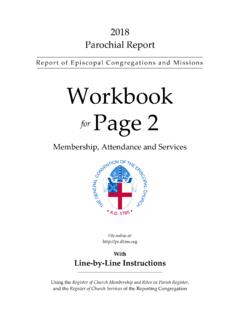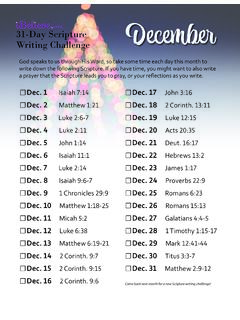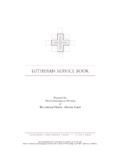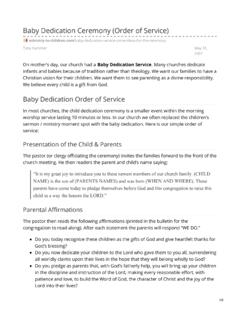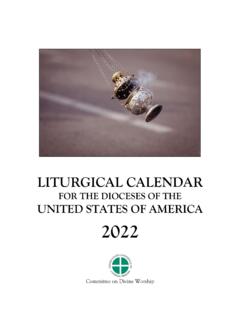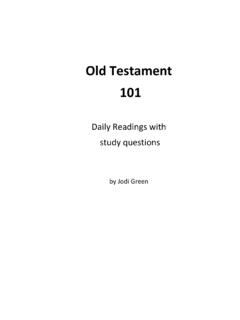Transcription of SERMONS FOR Advent and Christmas 2021 - …
1 SERMONS FORA dvent and Christmas 2021An offering of SERMONS That Work SERMONS THAT WORK23 The tune, which you may have already known or which you may have discerned from the pattern of the lyrics, will be sung again in a few months beginning with the phrase, O sacred head, sore wounded. What are we to make of this? Briefly, I would suggest two things. First, the reminder that the Lord whom we meet at Bethlehem, lying among the animals in the cool of the night, is the same Lord who will grow and teach and heal and, eventually, give himself over to humiliation and death for love of us that this simple golden thread of love characterizes the entire life of the One we greet anew this season. And second, that we are to be about our work preparing ourselves and this beautiful, broken world to meet him. Moreover, we are to expect that we will meet him, coming closer and closer until we see him as he truly is.
2 What a mission! What joy! On behalf of SERMONS That Work and The Episcopal Church Office of Communication, I wish you a blessed Advent and a merry Christmas . Your brother in Christ,Christopher Sikkema The Episcopal Church Advent 2021 Dear Reader:Thank you for downloading SERMONS for Advent and Christmas , a collection of materials prepared by some of the best preachers from across The Episcopal That Work, a ministry of The Episcopal Church Office of Communication, has provided free and high-quality SERMONS , Bible studies, and bulletin inserts since 1995. Every week, it is our pleasure to source, review, and publish these pieces; we hope they are edifying as you hear, read, mark, learn, and inwardly digest these and their corresponding Johann Sebastian Bach s Christmas Oratorio, you will find a haunting melody that seems somewhat out of place in the majestic and entrancing piece.
3 The 17th century text, originally penned in German by Paul Gerhardt, addresses our Lord directly, saying, How shall I fitly meet Thee, And give Thee welcome due? The nations long to greet Thee, And I would greet Thee too. O Fount of light, shine brightly Upon my darken d heart; That I may serve Thee rightly, And know Thee as Thou art. 45 Our impulse is to rush to the answer, No! We want to rush to an explanation of how this surely was not what Jesus could have meant. We want a clarification that meshes with our ideas of orthodoxy and our theological commitments. We want to say, as we all too often do, That s not what Jesus meant. We re not good at waiting. We rush for answers. We rush for explanations. But to be seasonal, let us engage with the text using an Advent hermeneutic. Hermeneutic is the word used to describe an approach to and interpretation of scripture .
4 Thus, in this season of waiting, let us hold off from that immediate jump to making this make sense. Instead, let us wait. Let us sit with the discomfort that these passages bring Jesus wrong? What would it mean if Jesus were wrong about this? His generation certainly did pass away before seeing him returning, descending in a cloud with power and great glory. If he were wrong, would that change the way we see Jesus as fully divine? If we maintain that Jesus was fully divine but wrong about the timing of the apocalypse, would it change the way we think of divine omniscience? If Jesus were wrong about the timing, could he have been wrong about other aspects of the great return? These questions are not easy to sit with. And yet, they are important questions to ask especially for that generation to whom Jesus was speaking. Imagine being part of that first generation of Jesus followers.
5 Jesus has promised that he would return. But now, people are dying, and understandably, the church is a bit confused. These questions we ve been raising, these are the questions that the community in Thessaloniki was asking as well. Paul s first letter to the Thessalonians is about precisely this issue. Jesus was expected to have come back before this generation passed away. Now, people are dying, and the community is concerned about the place those who have passed will have in the coming kingdom. When is Jesus coming back? Was Jesus wrong? Is Jesus coming back at all? Has Jesus left us alone with our death and our suffering? Words from today s psalm surely capture some of that anxiety, My God, I put my trust in you; let me not be humiliated, nor let my enemies triumph over me. And what enemy seems more triumphant than death? Weren t you supposed to come by now?
6 Weren t you supposed to come save us? These are the questions that come up while we sit with this conundrum using our Advent lens. Paul s response to the Thessalonians is simultaneously theological and pastoral. Further on in the letter, he addresses the community s fear about those who have already died, affirming that they will experience resurrection and have a place in the coming kingdom of God. He First Sunday of AdventCOLLECTA lmighty God, give us grace to cast away the works of darkness, and put on the armor of light, now in the time of this mortal life in which your Son Jesus Christ came to visit us in great humility; that in the last day, when he shall come again in his glorious majesty to judge both the living and the dead, we may rise to the life immortal; through him who lives and reigns with you and the Holy Spirit, one God, now and for ever.
7 Michael ToyIt s Advent again! It is that season where we are oriented in everyday life as well as liturgically toward Christmas . And yet, there are some stops we must make along the way. In today s waypoint, our readings look forward to Jesus triumphant return. Today, we look to the apocalypse. The prophecy from Jeremiah signals the coming of the fulfillment of God s promise when all shall live in peace and justice. This era of justice and flourishing for all people, we can all probably agree, has not yet come to pass. The coming Messiah was meant to usher in this age of peace on earth, end to war, and an end to the woes of humanity. And yet, in our gospel reading from Luke, Jesus says that time has not yet come. Instead, he is declaring prophecies of distress, roaring of waves, fear and foreboding. This time of distress of the Son of Man s return is not far away in the future, according to Jesus, who teaches, Truly I tell you, this generation will not pass away until all things have taken place.
8 Reading this sentence plainly or literally surely is a bit embarrassing. A bit embarrassing not just for us, but for Jesus as well. It certainly seems like he is saying that his return will be imminent. Here we are, nearly two thousand years later, and the second coming of Jesus has still not occurred. So, was Jesus wrong? READINGSJEREMIAH 33:14-16; PSALM 25:1-9; 1 THESSALONIANS 3:9-13; LUKE 21:25 -3667also acknowledges those feelings of grief, helplessness, and powerlessness that accompany that feeling that God has abandoned or forgotten us. He declares that we wait with wait with faith is to acknowledge that the waiting is not pointless. It is to believe that the waiting will be worth it. In addition to cognitive belief, waiting is a time for feeling. We see in Paul s letter that he himself is waiting to see this community again. But his faith influences the way that he waits to be reunited.
9 While apart, he reaches for that feeling of joy found in each other s presence: How can we thank God enough for you in return for all the joy that we feel before our God because of you? Night and day we pray most earnestly that we may see you face to face and restore whatever is lacking in your faith. Here, Paul is naming the joy of Christian connection, but he is also naming the fact that he misses this community of his friends. Waiting is a time to look around and recognize that all is not as it should be or could be. Waiting is the time to lean into these feelings of longing. It is a time to lean into those feelings that not all is right, and that there is something better to come. It is a time to dream; it is a time to imagine. When we wait, though it seems that death and suffering run rampant and unrestrained through our world, we dream of being comforted.
10 We dream of being reunited with loved ones. We dream of a time when God is going to make everything alright. To echo the words of Jeremiah, we dream of a time when God s promise is fulfilled, and all will live in safety and in flourishing. We dream of a day when God will execute justice and righteousness throughout the the coming weeks of Advent , we will hear of the prophets who came to prepare the way for Jesus, especially John the Baptizer. We will hear a message of repentance and of a baptism of fire. And of course, we will hear of Mary and Elizabeth. The task before us is to read and hear these stories in the spirit of Advent . Advent is a time to stop and to hesitate. It is a time to dig into the discomfort and seeming incongruities scripture presents to us. It is a time to linger with questions rather than rush to answers. These moments of delay or disruption create space to feel.



